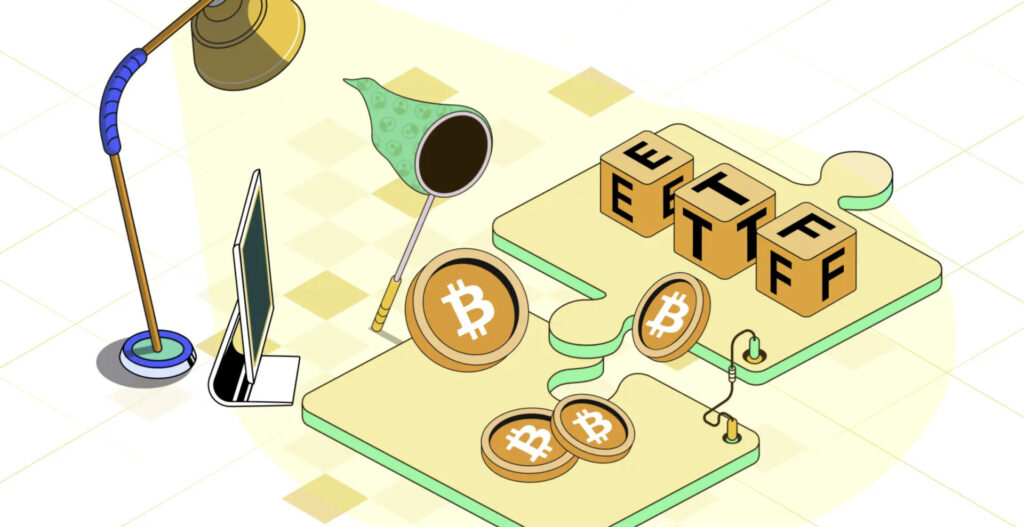Whats Next After Bitcoin ETF: Beyond Bitcoin ETFs – Exploring the Future of Cryptocurrency Investments
As the dust settles on the landmark event of Bitcoin ETFs’ debut, investors and crypto enthusiasts alike are pondering what’s next after Bitcoin ETFs. The introduction of these funds has been a game changer, but the world of cryptocurrency refuses to stand still. In this article, we explore the emerging investment vehicles, from Ethereum and altcoin ETFs to innovative financial products like NFT and green ETFs, that could shape the future of digital asset investing. Plus, we’ll look into the regulatory adjustments and technological leaps that might redefine market dynamics, all while keeping an eye on “whats next after Bitcoin ETF” developments.
Key Takeaways
- The evolving landscape of crypto investments now includes Bitcoin ETFs and is expanding to Ethereum and altcoin ETFs, offering investors more mainstream opportunities, increased liquidity, and broader exposure to a range of digital assets.
- Innovations in crypto-related ETFs feature Non-Fungible Token (NFT) ETFs and green ETFs, highlighting the market’s response to the growing NFT trend and increasing demand for environmentally responsible crypto investments.
- Regulatory developments by the U.S. SEC and other global bodies are significantly shaping the cryptocurrency market, influencing the introduction of diverse crypto investment vehicles, and providing clearer frameworks for investor protection.
The Evolution of Crypto Investment Vehicles

The environment of cryptocurrency investments has been continuously changing. In its early days, investing in cryptocurrencies like Bitcoin appeared to be a challenging venture, accessible only to those who could manage their investments through a Bitcoin wallet. The introduction of bitcoin futures etfs brought a level of familiarity to the investment process, allowing more investors to participate in the burgeoning Bitcoin market.
The introduction of spot Bitcoin ETFs, including the Franklin Bitcoin ETF, Hashdex Bitcoin ETF, and Invesco Galaxy Bitcoin ETF, indicated another significant change in the world of bitcoin trading. With their approval by the U.S. Securities and Exchange Commission (SEC), Bitcoin ETFs offered a new level of credibility to cryptocurrency investments. The participation of well-established financial institutions, such as BlackRock, signaled to Wall Street and retail investors alike that cryptocurrencies were a legitimate and potentially profitable asset class. The approval of spot Bitcoin ETFs, such as those by Invesco Galaxy and Blackrock, signifies an industry-wide recognition of Bitcoin’s legitimacy as a tradable asset class, with Bitcoin ETF issuers playing a crucial role in this development, including the emergence of the bitcoin fund market, like the WisdomTree Bitcoin Fund.
The Next Frontier: Ethereum and Altcoin ETFs

With the maturing cryptocurrency market, Ethereum and altcoin ETFs are surfacing as the upcoming focus in crypto investments. Offering a diversified range of assets within the ETF, these investment vehicles are poised to provide advantages such as improved investor protection, enhanced liquidity, and simplified investment processes, all of which are significant in the continuously growing crypto industry.
Diversification through Altcoin ETFs
Altcoin ETFs are designed to offer investors a diversified portfolio of digital assets. Unlike Bitcoin ETFs, which concentrate on a single cryptocurrency, Altcoin ETFs encompass a range of alternative cryptocurrencies, providing investors with exposure to a wider array of digital assets. This approach not only mitigates the risks associated with holding individual altcoins but also eliminates the need to directly use cryptocurrency exchanges.
The potential returns from investing in Altcoin ETFs are contingent on the performance of the underlying assets. While specific returns cannot be guaranteed, investors have the potential to benefit from the growth and adoption of various altcoins that are part of the ETF’s holdings, as well as the overall growth of the crypto industry.
Potential Impact on Altcoin Market Value
Historically, ETFs have significantly influenced the market value of assets, contributing to price volatility and potentially influencing market efficiency. This impact is also observed in the cryptocurrency market, with ETFs being traded on major stock exchanges like the New York Stock Exchange.
The introduction of altcoin ETFs could lead to:
- A surge in demand for alternative cryptocurrencies
- Enhancing their market value
- Attracting substantial capital from both retail and institutional investors.
On the flip side, the increased liquidity and stability brought about by Altcoin ETFs could potentially decrease market volatility by diminishing the impact of major investors. This, in turn, could have a positive effect on Bitcoin prices, as the market sentiment towards cryptocurrencies becomes more positive.
Innovations in Exchange-Traded Funds

As the crypto industry continues to progress, the investment vehicles that offer access to it also advance. Innovative products such as Non-Fungible Token (NFT) ETFs and green ETFs focused on environmentally friendly crypto projects are emerging. These products represent the next generation of ETFs, providing investors with even more ways to participate in the crypto market.
Non-Fungible Token (NFT) ETFs
Non-Fungible Token (NFT) ETFs are a relatively new innovation in the investment landscape. These ETFs are designed to invest in companies involved in NFTs, cryptocurrencies, and blockchain technology, providing investors with an opportunity to gain exposure to the growing NFT market.
NFT ETFs operate by securely storing NFTs on blockchain networks and monitoring the performance of a collection of NFT-related assets. These ETFs are traded on stock exchanges, enabling investors to buy and sell shares similar to traditional stocks. By offering exposure to NFT-related companies and the broader blockchain industry, NFT ETFs provide a unique opportunity for investors to tap into the potential of this dynamic market.
Green ETFs in Crypto
In response to increasing concerns about the environmental impact of cryptocurrencies, green ETFs have emerged as a potential solution. These ETFs focus on investing in companies that advocate for socially and environmentally responsible policies and initiatives, thereby addressing some of the key criticisms of the crypto industry.
A number of environmentally friendly ETFs have emerged in the cryptocurrency market, including:
- ARK Invest
- BlackRock
- VanEck
- WisdomTree
- Fidelity
- Invesco
- Franklin
- Hashdex
- Valkyrie Bitcoin Fund
By investing in these companies, green ETFs in crypto contribute to energy efficiency and sustainability by offering investors access to environmentally conscious investment opportunities and encouraging the use of renewable energy and sustainable practices.
Regulatory Developments and Their Influence

Regulatory developments play a significant role in molding the future of cryptocurrency investments. The decisions made by regulatory bodies, such as the U.S. Securities and Exchange Commission (SEC), have a significant impact on the types of investment products that are approved and the overall growth of the crypto market.
The Role of SEC Chairman Gary Gensler
Since assuming the role of SEC Chairman, Gary Gensler has had a profound influence on the cryptocurrency market. Gensler has adopted a proactive approach towards the cryptocurrency market, implementing a regulatory strategy for its oversight. His influence has been instrumental in the approval of new crypto investment products, including over 12 bitcoin ETFs, indicating a more receptive yet cautious approach to cryptocurrency investment.
The crypto market’s response to Gensler’s regulatory approach has been mixed. While there have been allegations of spreading fear, uncertainty, and doubt from the crypto community, the SEC’s approval of a spot bitcoin ETF indicates a degree of receptiveness to crypto investments.
Global Trends in Crypto Regulation
Beyond the United States, global trends in crypto regulation are shaping the future of cryptocurrency investments. In recent years, we’ve seen a focus on financial services and anticipation of more rigorous regulation in light of recent scandals, as well as a drive for greater global cryptocurrency regulation by the International Organization of Securities Commissions (IOSCO).
Different countries are establishing their own rules and guidelines for cryptocurrency regulation. In the European Union, for example, the Markets in Crypto-Assets (MiCA) framework has been implemented to regulate the crypto-asset markets, providing clear rules and safeguarding investors in the crypto space.
These global trends in crypto regulation will continue to influence the development and adoption of new investment vehicles.
Digital Asset Management Innovation

As the world of cryptocurrency continues to develop, the methods for managing digital assets also progress. Innovations such as crypto hedge funds, private trusts, and smart contract-based investment strategies are revolutionizing the way investors approach cryptocurrency investments.
Crypto Hedge Funds and Private Trusts
Crypto hedge funds are specialized investment vehicles that focus on cryptocurrencies. They:
- Trade cryptocurrencies
- Engage in complex investment strategies like crypto derivatives and futures
- Invest in venture capital and private equity for blockchain startups
- Broaden the range of investment opportunities through active investment in digital assets
- Employ diverse strategies including fundamental and quantitative approaches.
Private trusts in the cryptocurrency space bring innovation to asset management by leveraging the ‘trustless’ nature of blockchain technology, which eliminates the reliance on traditional trust in third parties. These trusts secure ownership and verify transactions through cryptography, enabling direct peer-to-peer transactions without intermediaries.
Smart Contract-Based Investment Strategies
Smart contracts are:
- Self-executing contracts with the terms of the agreement directly written into code
- Used to automate agreements
- Employed in the creation of decentralized applications and tokens
- Used to automate investment strategies, optimizing and potentially improving the efficiency of investment portfolios.
Smart contracts play a role in various investment strategies within the crypto market. From the purchase, sale, and exchange of nonfungible tokens (NFTs) within the digital entertainment sector to compensating independent creators like authors, musicians, and filmmakers, smart contracts are a powerful tool in the world of cryptocurrency investments.
Integrating Crypto into Traditional Finance
The integration of crypto into traditional finance marks a notable development in the investment world. Through the use of hybrid products and investor education, cryptocurrencies are becoming more accessible, and the risks associated with them are becoming better understood.
Bridging the Gap with Hybrid Products
Hybrid financial products in the world of cryptocurrency involve collaborative efforts between traditional banks and crypto asset firms to develop innovative banking services and mechanisms. This serves as a bridge between the two financial domains, offering investors a familiar yet innovative way to gain exposure to the crypto market.
Examples of successful hybrid products that have effectively merged cryptocurrency with traditional finance include:
- Hybrid Finance (HyFi)
- Qtum
- CeDeFi
- Millicent
These products facilitate investor access to the crypto market through crypto investment funds and hybrid crypto exchanges, providing a platform for investors to engage in cryptocurrency trading and access the crypto market.
Educating Investors and Mitigating Risks
One of the biggest challenges in integrating crypto into traditional finance is the education of investors. The volatile nature of cryptocurrencies and the unique risks they pose require a comprehensive understanding before investment decisions are made.
Financial literacy plays a significant role in cryptocurrency investing. By providing investors with the essential knowledge and expertise to navigate this intricate and constantly changing market, they are enabled to make well-informed and prudent investment choices. Strategies to mitigate the risks of cryptocurrency investment include:
- Understanding risk tolerance
- Investing only expendable funds
- Transferring crypto assets to cold storage
- Hedging the crypto portfolio
- Diversifying the portfolio
- Refraining from undertaking unnecessary risks.
Future Technologies and Market Expansion
Looking ahead, the ongoing development of technology and the broadening of the market offer both enticing opportunities and potential challenges for cryptocurrency investments. From the rise of decentralized finance (DeFi) ETFs to the impact of quantum computing on crypto security, the landscape of cryptocurrency investment continues to evolve.
The Rise of Decentralized Finance (DeFi) ETFs
Decentralized Finance (DeFi) ETFs represent a new frontier in cryptocurrency investments. These exchange traded fund collections of DeFi assets are traded on conventional exchanges, providing investors with exposure to the growth of the DeFi market.
DeFi ETFs operate by directly holding the cryptocurrency and creating a portfolio that mirrors the performance of the DeFi tokens. This provides investors with exposure to the growth of the DeFi market while simplifying the management of individual DeFi assets.
As a result, DeFi ETFs present a unique opportunity for investors to tap into the potential of this dynamic market.
Quantum Computing and Crypto Security
The advancement of quantum computing technology has the potential to render the cryptographic algorithms used in cryptocurrencies obsolete. Quantum computers possess the capability to easily factor large numbers that are currently considered extremely challenging for classical computers, thereby posing a significant threat to the security of cryptocurrency networks.
However, the crypto industry is not remaining static. Strategies are being implemented to develop post-quantum cryptography methods like:
- Lattice-based cryptography
- Code-based cryptography
- Hash-based cryptography
- Multivariate cryptography
These methods are being developed to address the risks associated with quantum computing. As quantum computing continues to advance, the crypto industry will need to stay one step ahead to ensure the security of digital assets.
Summary
Cryptocurrency investments have come a long way since the inception of Bitcoin. From the approval of Bitcoin ETFs to the prospect of Ethereum and altcoin ETFs, the cryptocurrency investment landscape is evolving at an unprecedented pace. The emergence of NFT and green ETFs, the influence of regulatory developments, and the integration of crypto into traditional finance through hybrid products and investor education are all contributing to the growth and maturity of the market. As we look to the future, the rise of DeFi ETFs and the potential impact of quantum computing on crypto security remind us that the world of cryptocurrency investment remains a dynamic and exciting frontier.
Frequently Asked Questions
What are the benefits of investing in Bitcoin ETFs?
Investing in Bitcoin ETFs provides a convenient way to access Bitcoin without managing a separate wallet, while also offering the security and regulation of traditional stock exchanges. Additionally, they are regulated by the SEC for added credibility.
What are Altcoin ETFs and how do they provide diversification?
Altcoin ETFs provide diversification by allowing investors to acquire a combination of diverse cryptocurrencies, which helps mitigate potential risks across multiple assets. This allows for more balanced and varied investment opportunities.
What are NFT ETFs and how do they operate?
NFT ETFs are investment products that focus on NFT, crypto, and blockchain companies, and are traded on stock exchanges like regular stocks.
How do crypto hedge funds and private trusts contribute to digital asset management innovation?
Crypto hedge funds and private trusts contribute to digital asset management innovation by providing diversified portfolios and engaging in complex investment strategies such as crypto derivatives and futures, as well as investing in venture capital and private equity for blockchain startups. This helps drive innovation and growth in the digital asset management space.
What impact could quantum computing have on the security of cryptocurrencies?
Quantum computing could disrupt digital security, posing a threat to cryptocurrencies and blockchain networks. However, the crypto industry is working on post-quantum cryptography to mitigate these risks.

